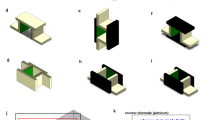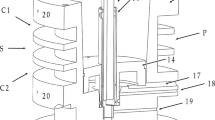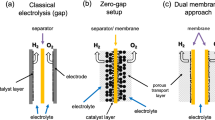Abstract
Two difficulties have commonly been experienced in the exploration of potential distributions in electrolytic tanks, when alternating current is used : (a) non-linear conduction due to polarization at the electrode surfaces1, which becomes serious at very low potential differences or currents, and (b) corrosion of the electrodes causing the conducting path to assume a leading power factor2, which increases with increasing current density. Both effects are greatly reduced by raising the working frequency ; but they are incompatible with one another if very fine probe electrodes are used. The effect of frequency on the non-linear conduction is illustrated in the accompanying diagram.
This is a preview of subscription content, access via your institution
Access options
Subscribe to this journal
Receive 51 print issues and online access
$199.00 per year
only $3.90 per issue
Buy this article
- Purchase on Springer Link
- Instant access to full article PDF
Prices may be subject to local taxes which are calculated during checkout
Similar content being viewed by others
References
Rollet, A. P., C.R. Acad. Sci., Paris, 185, 457 (1927).
Shipley and Goodeve, Trans. Amer. Electro-Chem. Soc., 52, 377 (1927).
Author information
Authors and Affiliations
Rights and permissions
About this article
Cite this article
MAKAR, R., BOOTHROYD, A. & CHERRY, E. An Electrolytic Tank for Exploring Potential Field Distributions. Nature 161, 845–846 (1948). https://doi.org/10.1038/161845a0
Issue Date:
DOI: https://doi.org/10.1038/161845a0
This article is cited by
Comments
By submitting a comment you agree to abide by our Terms and Community Guidelines. If you find something abusive or that does not comply with our terms or guidelines please flag it as inappropriate.



